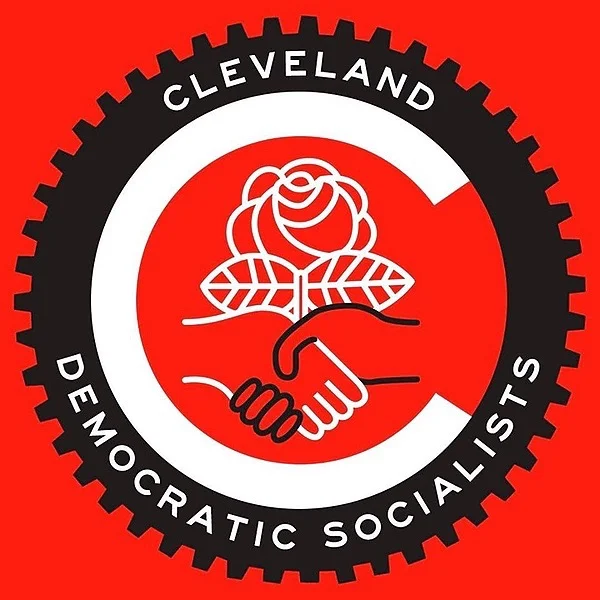

Caucuses in Cleveland DSA
Author: Julie C
The purpose of this piece is to notify Cleveland DSA members that there are now two local caucuses in our chapter and to give some brief history of internal politics in our chapter from a personal and limited perspective. These caucuses do not hold any formal positions of power within our chapter, and in fact are not “officially affiliated” with DSA Cleveland, but they were created in order to bring comrades together based on shared identities and vision.
The Black and Brown (B&B) Caucus was announced at or around the time of the June 2025 General Meeting. Inspired by Detroit DSA’s Black & Brown Alliance, as well as DSA’s national Multiracial Organizing Committee, the purpose of the B&B caucus is to bring together members of color and focus on ways to increase our diversity within the chapter, and working class power in Northeast Ohio’s communities of color. The caucus is not exclusive to members of color and there is no formal leadership or approval process for planning events for the B&B Caucus. If you are interested in this caucus, please reach out to Shay or Emma B on our member Slack.
The Praxis Caucus was announced at the September 2025 General Meeting and its Points of Unity can be found here. This caucus was formed with the intention of bringing members together to form a long-term and proactive vision for DSA in Cleveland and the surrounding areas. While the founding members have ideas on where to start, the current goal is to bring more members together to help develop the vision for our chapter in a way that aligns with our Points of Unity. All Cleveland DSA members are welcome to join meetings and events held by Praxis. If you are interested in this caucus, please reach out to Justin E or Julie C on our member Slack.
Background
When I joined Cleveland DSA (fall 2020), our chapter was very focused on local issues and local organizing. We were not fully plugged into the national org structure or any particular working group/committee in any serious or noticeable way. Also, from my perspective, while there were some political differences among comrades, our membership seemed rather homogeneous and came to consensus regularly. The most obvious difference was the approach to electoral politics and our biggest political “battle” was whether or not to endorse Nina Turner in 2021. This issue drew our largest General Meeting crowd at that time (over 60 members) and the motion failed with about 63% of the vote (it needed 66%).
Since then our chapter has experienced sizable growth in our membership which has naturally magnified the differences in perspective of how to achieve our shared goals. The national organization is more visible and connected to the work that we do through the use of resources available to us as well as some of our members being plugged into the work of different national committees. We also have at least close to a dozen members who belong to various national caucuses. At our October 2024 General Meeting, we passed a much more rigorous endorsement policy and that policy was put to the test this year. A substantial amount of work was put into a project proposal that would see a local DSA member endorsed in their run for city council. That proposal failed 64 nay vs 51 yea after a zealous debate at our May General meeting (5/8/25). The Praxis caucus formed with core members who voted yea on endorsement.
During and after the May General meeting, the political strategies among Cleveland DSA members have been more clearly outlined through internal debates and discussions. To be clear, DSA is a socialist organization. We believe in transitioning our society from capitalism to socialism and our “political” differences stem from what is the best way to do that. And even more specifically at our chapter level, what should our focus be in order to contribute to that outcome. While the differences in political opinion at times seem great, we are very much working towards the same goal.
- There are many lists and articles about the national caucuses but I am not linking any here since there is no “official” list that broadly summarizes them.
The post Caucuses in Cleveland DSA appeared first on Democratic Socialists of America.


The Goth Rock Opera of Our Present
By Tiffany P
“Gather around, kids! I’m going to show you how to use drugs.” – Terrance Zdunich
I watched Repo! The Genetic Opera (2008) when it first released. Back then, I enjoyed the music, wacky characters, and gore. Today, the movie hits different. The movie takes place in the not-too-distant future. That future has arrived.
GeneCo is a company that specializes in organ transplants. At first, the organ transplants were necessary because of a pandemic that caused mass organ failure. GeneCo harvested organs from the dead and sold them to the living. Many could not pay for the surgery so they signed a payment plan with the company. Rotti Largo is the founder of GeneCo and should look very familiar to many of us today. He is your typical selfish sadistic billionaire. He lobbied a bill through Congress to make it legal for this private company to murder citizens if they are 90 days late on
their payments. By the time the movie starts, the people are tired of living in fear. Prop 598 would make it illegal for GeneCo to repossess organs. GeneCo gaslights the citizens and says they need the ability to murder your neighbor or else they might run out of organs to save your life. This is a typical billionaire tactic that keeps citizens divided and voting against their own interests.
Working for GeneCo is a more extreme version of what it’s like to work in corporate America today and certain members of government are trying to get us even closer to this dystopian reality. They are attempting to give more power to the employer, less power to the worker, reduce safety in the workplace, and even want to
eliminate child labor laws.
The Repo Man is the one who legally murders citizens to reclaim stolen property. By property, they mean someone’s heart, spine, or any other organ. You would think anyone who would do a job like this must be a monster. Far from it. The movie does a very good job making the Repo Man a sympathetic father. However, his current job of cutting out someone’s heart with no anesthetic while it’s still beating has taken a major toll on his psyche. He develops a split personality to hide behind to do much of the dirty work. This reminds me of slaughterhouse workers of today. They murder animals who struggle and scream for their life all day long. They are paid very little and are often times undocumented workers. This allows the company to abuse and threaten them. Because of the violent and cruel nature of the job, slaughterhouse workers will either quit because of extreme PTSD or develop violent tendencies outside of work. Meat packing factories are also often times staffed by undocumented workers. They have very few safety standards and finger and hand amputations are common there.
Genterns are a type of female worker at GeneCo. You see them perform various jobs such as surgery and inventory. They are expected to perform sexual acts for their employer, dress in very skimpy clothing, and can’t complain if their co-worker is suddenly murdered in front of them. Clearly, Genterns need to form a union. It is not unusual in today’s workplace for a woman to feel pressure to be more sexualized or even perform sexual favors to get promoted. Harassment and abuse are swept under the rug and employees are expected to suffer in silence. Employees at GeneCo can be forced into contracts that prevent them from leaving the company alive. They are in a type of indentured servitude. They work for the company in exchange for a surgery, but if they leave then the Repo Man will kill them. Today, companies want their employees to sign contracts which prevent them from leaving. This type of contract emboldens the employer to abuse their employees, and if the employee chooses to leave then the employer will steal their paychecks.
We are not shown this world’s economy directly, but we get a sense there is the very poor and the very rich with not much in between. GeneCo spends a lot of money advertising for cosmetic surgeries. They encourage people to buy a name brand spine or spleen as a fashion statement. Despite being poor, many people have these surgeries because they sign up for a payment plan. This makes the surgeries more affordable. This is reflected in the Labubu craze going on today. In previous decades, cosmetic sales would rise during financial turmoil and depression. Labubus make you look cool to your friends at a relatively affordable price. People nowadays understand they will never afford a house or have financial security so why not buy a $30 toy? It’s not as if saving that $30 will suddenly allow them to buy a house. Many buy Labubus because they are depressed and these little toys provide a glimmer of joy in their day.
The Genetic Opera in the movie itself is a massive advertising campaign. It is a yearly event that is run like a mega church. There is a band and a lot of spectacle. People testify on live TV to how GeneCo helped them. A single mom needed a kidney transplant and said the company showed her sympathy, but the company will have no problem turning her children into orphans if she is late on her payments. This reflects the constant flood of propaganda we see today. Companies spend millions to develop brand loyalty to keep their customers coming back for decades. None of us are immune to propaganda. Remember, they need us more than we need them.
Repo! The Genetic Opera will be playing at Hyperreal Film Club in Austin on October 6th at 7:30pm.
The post The Goth Rock Opera of Our Present first appeared on Red Fault.
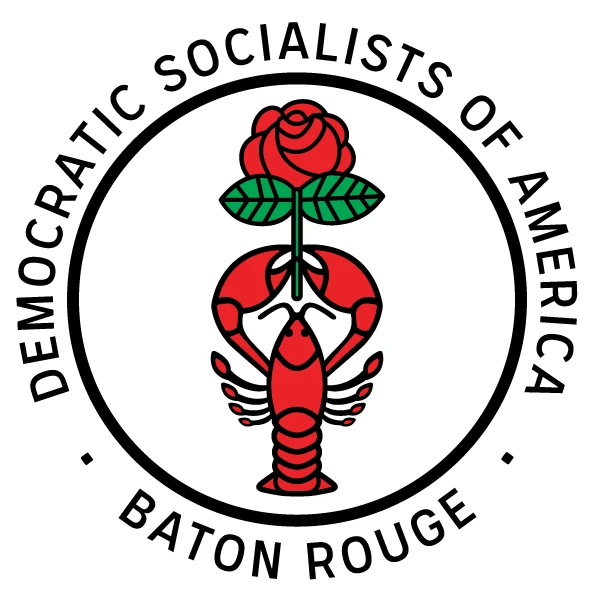

Statement on the Inexcusable Arrest of the Seven Members in Students for a Democratic Society at LSU
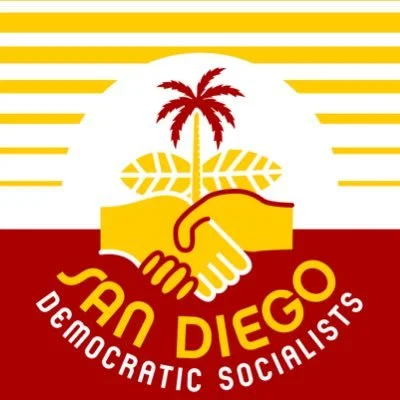

Fight fasciscm! Vote YES on Prop 50
DSA San Diego has voted to endorse and campaign for Proposition 50, which will be on the California ballot for a special election on November 4, 2025. If it passes, Prop. 50 would implement a temporary redistricting of California’s Congressional seats to counteract Republican gerrymandering by redrawing five Republican seats to favor Democrats until the [...]
Read More... from Fight fasciscm! Vote YES on Prop 50
The post Fight fasciscm! Vote YES on Prop 50 appeared first on Democratic Socialists of America | San Diego Chapter.


Yes on Prop 50 – Activities
Can’t make one of our DSA San Diego canvasses? There are plenty of other ways to get involved in this fight: Donate to California DSA’s PAC! (Donate here) This helps us print DSA-branded literature and purchase canvassing tools for our outreach efforts. We rely entirely on contributions from members and supporters. Every little bit helps! [...]
Read More... from Yes on Prop 50 – Activities
The post Yes on Prop 50 – Activities appeared first on Democratic Socialists of America | San Diego Chapter.
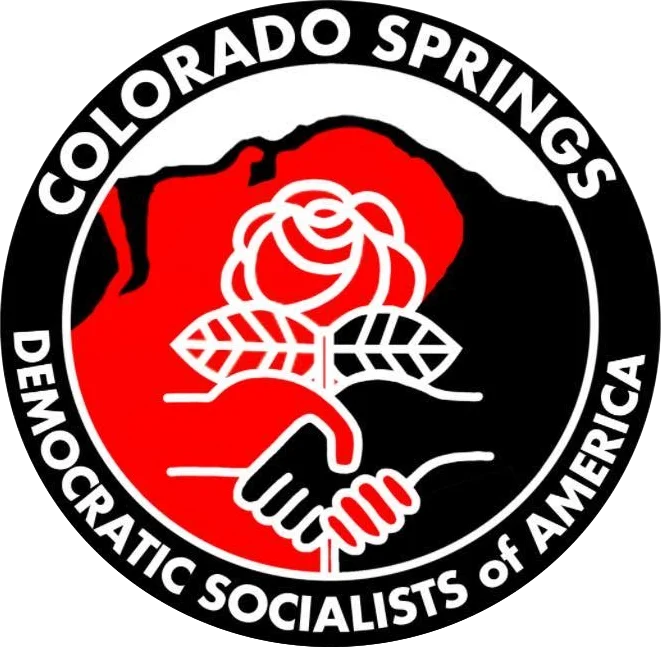

Colorado Springs DSA stands in solidarity with D11 School board candidate Charles Johnson against racist attacks
The Colorado Springs DSA strongly believes in the power of public education to empower and to liberate. We believe that the best people to decide how and what to teach are professional educators. We have been deeply troubled at the consistent interference from the extremist school board in District 11 of Colorado Springs as they deprive teachers of the very agency that allows them to excel. Their decisions are becoming ever more concerning. No novels in high school English classes. Pages physically cut out of health textbooks. And just last week we understand they cut from the curriculum the incredible abolitionist, writer, and orator Frederick Douglass.
Instead of cutting Douglass from the curriculum, we choose to live by his words, “I would unite with anybody to do right and with nobody to do wrong.” We choose to unite with Charles Johnson, a union-endorsed candidate for the school board in D11. We know that he is trying to do right, even as the allies of the extremists now vying for seats on the board play into the shameful, racist tradition of painting Black men as criminals by sending out a mass text showing the mugshot from Charles’s 2020 arrest. True to what we know of him, he was guilty only of, as John Lewis loved to say, making good trouble.
In 2019, a good friend of Charles, De’Von Bailey, was shot in the back and killed by the Colorado Springs Police Department. Charles organized for greater accountability for the department. At COS DSA, we know that Black history is fundamental to American history. Maybe if these extremists spent more time studying it instead of erasing it, they would know how predictable it was that Charles was then singled out for arrest by CSPD. But they don’t know, and we suspect they just don’t care.
We stand in solidarity with Charles Johnson. Charles has been a friend to many of us who are organizers and activists in Colorado Springs, and we know him to be kind and insightful. A product of D11 himself, his commitment to teachers and students in the district is an inspiration. As the Colorado Springs Education Association prepares to strike on October 8th, we call on everyone able to show teachers their support by joining them on the picket line and by standing with Charles and the rest of the union-endorsed school board candidates come the November election. Their only goal is one we all surely share; outstanding public education in this city we love.


Colorado Springs DSA stands in solidarity with the Sumud Flotilla
On 10/1/2025 the Global Sumud Flotilla was intercepted by the IDF while trying to deliver life saving aid to the Palestinians living under a blockade in Gaza. A coalition of organizers, humanitarians, doctors, artists, clergy, lawyers, and seafarers across 57 countries were just off the coast of Gaza, intending to break Israel’s blockade with much needed humanitarian aid, when they were violently intercepted by the IDF.
We condemn this act of violence against a group of peaceful humanitarians working to end the man-made famine imposed upon the Palestinians in Gaza. While Israel continues to actively and mercilessly bomb the Gaza strip to complete its goal of genocide and ethnic cleansing, the Global Sumud Flotilla was a beacon of hope to those waiting for much needed relief. The Global Sumud Flotilla poses no threat. They are unarmed and only carrying supplies needed by the population of Gaza such as baby formula, medical supplies, and food.
To meet a peaceful convoy of humanitarian aid with such violence and little regard for human life is appalling. The response from Italy to try and force the Global Sumud Flotilla to turn away, siding with the IDF and betraying their own citizens, is shameful. The United States is turning a blind eye to the U.S. citizens that have been kidnapped from the convoy while it continues to be involved with and enable the illegal and immoral actions of the illegal occupation known as Israel.
We are living in a moment which, when looked back on, everyone will say they have always been against these violent acts. We must keep hope, because to keep hope is to believe truly and honestly that Palestine will be free.
Israel must release all the hostages they have kidnapped from the Global Sumud Flotilla, they must ensure their safety, and they must allow aid into Gaza. As activist and arguably one of the most famous members of the Global Sumud Flotilla, Greta Thunberg, has said, “I'm not scared of Israel. I'm scared of a world that has seemingly lost all sense of humanity.” We must not lose our humanity and continue to uplift the Palestinian cause as it is just, it is moral, and it is freedom, not just for the Palestinians, but for all of us. Because none of us are free until all of us are free. We stand with the Global Sumud Flotilla, we condemn the violence and kidnapping, and we stand with the Palestinians in their hope to someday soon be truly free.
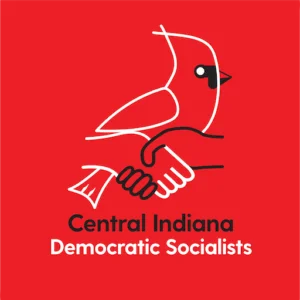
SVDSA Supports Measure A to Protect our County Hospital System
On independence day during the first year of his second term, President Donald J. Trump signed budget reconciliation bill H.R.1 into law. Dubbed by conservative lawmakers as the ‘One Big Beautiful Bill’, H.R.1 was the catalyst for a tumultuous legislative cycle defined by rewrites, carveouts, and dishonesty. While the president claimed this bill would address inflation and the deficit and put money back in the pockets of Americans, realistically this bill functions as the continuation of the immense wealth transfer towards the ruling class that has been poorly masked in this country for decades.
H.R.1 is abundant with cuts to multiple institutions that sought to uplift those in need. Perhaps the most dangerous of these gut the public health systems across the country, resulting in billions of dollars stripped from hospitals, clinics, and other healthcare services that millions of people rely on every day. Silicon Valley DSA believes healthcare is a fundamental human right. The Trump Administration and conservative lawmakers, who kowtow and walk in lockstep with everything the president demands, seek to deny this right to those who need adequate social safety nets to uplift and propel the community.
Some of the more alarming cuts for the community Silicon Valley DSA calls home are those that impact Medi-Cal. Santa Clara County relies on approximately $3.5 billion in federal funding annually, and the cuts within H.R.1 are anticipated to cause losses of nearly 30% of that funding, which goes towards essential healthcare services within the community, including but not limited to emergency rooms, trauma response units, mental health programs, cancer treatment centers, community clinics, and the only burn unit in the Bay Area, one of only three such facilities between Los Angeles and the Oregon border. Additionally, a quarter of all residents and half of all county hospital patients rely on Medi-Cal for adequate, affordable treatment.
The damage will not stop at those who rely on Medi-Cal, though. Budget cuts such as those seen in H.R.1 cause ripple effects. A loss of federal funding at this scale can devastate the infrastructure of the community’s public health system as a whole, being the impetus for longer wait times, shrinking staff and capacity, and even the closing of facilities entirely. As Santa Clara County already has the second lowest capacity emergency department (ED) beds per capita, losing this funding puts at risk the health and safety of all county residents, regardless of provider.
To combat what can only be described as a direct attack on the health and welfare of the American people, Silicon Valley DSA has unanimously decided to endorse Measure A, a ballot measure authored by the Santa Clara County Board of Supervisors to be voted on during the November 4, 2025 special election.
Measure A is a temporary 5/8 cent sales tax increase across Santa Clara County that could raise upwards of $330 million annually to support the public health systems that are under siege by the current administration. This tax, which equates to approximately 62 cents per every $100 spent, will save lives. The generated tax revenue, while not completely offsetting the cuts, will keep hospitals open, keep medical professionals and facility staff employed, and protect access to care for hundreds of thousands of Santa Clara County residents. Measure A would expire in April 2031, and independent audits and strict oversight will seek to ensure this generated sales tax revenue will be allocated appropriately. We feel it’s also important to note that, per Regulation 1602 Sections 6091, 6353, and 6359 of the California Revenue and Taxation Code, groceries, prescriptions, and other necessities are exempt from sales tax, meaning these daily bills will not be impacted were Measure A to pass this November.
We recognize that a sales tax is a regressive funding mechanism and isn’t the ideal answer to the circumstances we now face, but the urgency and severity of this crisis brought on by our lawmakers requires swift action. While imperfect, Silicon Valley DSA implores the community to vote ‘YES’ on Measure A during the November special election, and we intend to mobilize members, along with our allies in labor unions, community organizations, immigrants rights groups, public health advocates, and beyond to ensure its passage. Our initial campaigning efforts to help Measure A gain the momentum it needs have included phone banking and canvassing in collaboration with the South Bay Labor Council throughout September, and we will continue these efforts weekly until the election. We invite you to come join us. Find details on our calendar at https://siliconvalleydsa.org/events/.
In the meantime, recognition that this is not a permanent solution means continuing to push forward in our work garnering support for the ultimate goal of a fully funded, publicly owned, and democratically run healthcare system that ensures quality, timely care for all in need, as it has been proven time and time again private equity without fail negatively impacts healthcare.
Our fight is against both Democrats and Republicans who continue to diminish the rights and voice of the constituents they promised to serve to instead benefit themselves and their billionaire corporate donors. DSA believes a better world is possible, one where we democratically decide on how society is structured for the common good rather than the profit of a few. Join us at https://siliconvalleydsa.org/join/.
The post SVDSA Supports Measure A to Protect our County Hospital System appeared first on Silicon Valley DSA.
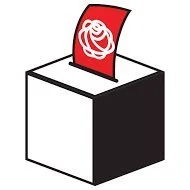

Endorsement: Zoelle Lane, Fort Collins Council
Zoelle Lane is running for Fort Collins Council. Zoelle is an immigrant, union member, and renter running to tackle Fort Collins’ cost of living crisis and to empower its residents. One of her goals for office is to raise the minimum wage, which is long overdue!
Zoelle is part of a slate of candidates in the Socialist Cash Takes Out Capitalist Trash fundraising project!